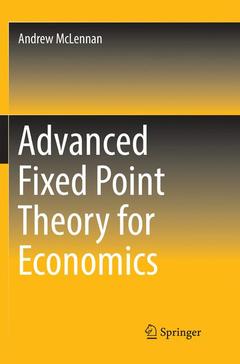Description
Advanced Fixed Point Theory for Economics, 1st ed. 2018
Author: McLennan Andrew
Language: English
Subject for Advanced Fixed Point Theory for Economics:
Keywords
fixed point theory; topology; topological degree; fixed point index; economic modeling; game theory; mathematical economics; economic theory; topological methods; metric space theory; Nash equilibrium; multivariate calculus; Brouwer fixed point theorem; Schauder fixed point theorem; Lefschetz fixed point theorem; Kakutani fixed point theorem; Eilenberg–Montgomery theorem; Fan–Glicksberg theorem; general equilibrium theory; differentiable manifold
Approximative price 137.14 €
In Print (Delivery period: 15 days).
Add to cartPublication date: 01-2019
Support: Print on demand
Approximative price 137.14 €
In Print (Delivery period: 15 days).
Add to cartPublication date: 07-2018
Support: Print on demand
Description
/li>Contents
/li>Biography
/li>Comment
/li>
Provides comprehensive coverage of fixed point theory at the highest possible level of generality
Avoids use of algebraic topology, resulting in intuitive and geometric arguments as well as greater accessibility
Requires no mathematical knowledge beyond that which is common to all theoretical economists



